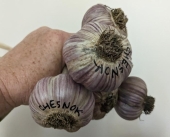posted 3 years ago
I normally grow two potato crops (June and December) each year here in upstate South Carolina. The spring crop plants grow from late March into June when the plants do dormant in the summer heat. Then any tubers left unharvested will start growing again in September and continue until frost kills back the top growth. When fall frosts threaten, I cover the plants with a heavy grade of frost cloth to extend the growing season and get them through the frosty nights undamaged. I can usually keep them growing into mid to late December before a severe enough frost gets through the frost cloth to kill the plants, at which point I harvest the tubers, leaving some to start the spring crop. Because of the short day length, the December crop won’t be as large as the June crop, but fresh potatoes for Christmas dinner are always welcome. Since the growing season for fall potatoes is fairly short, early maturing potato cultivars such as Red Norland work the best.







